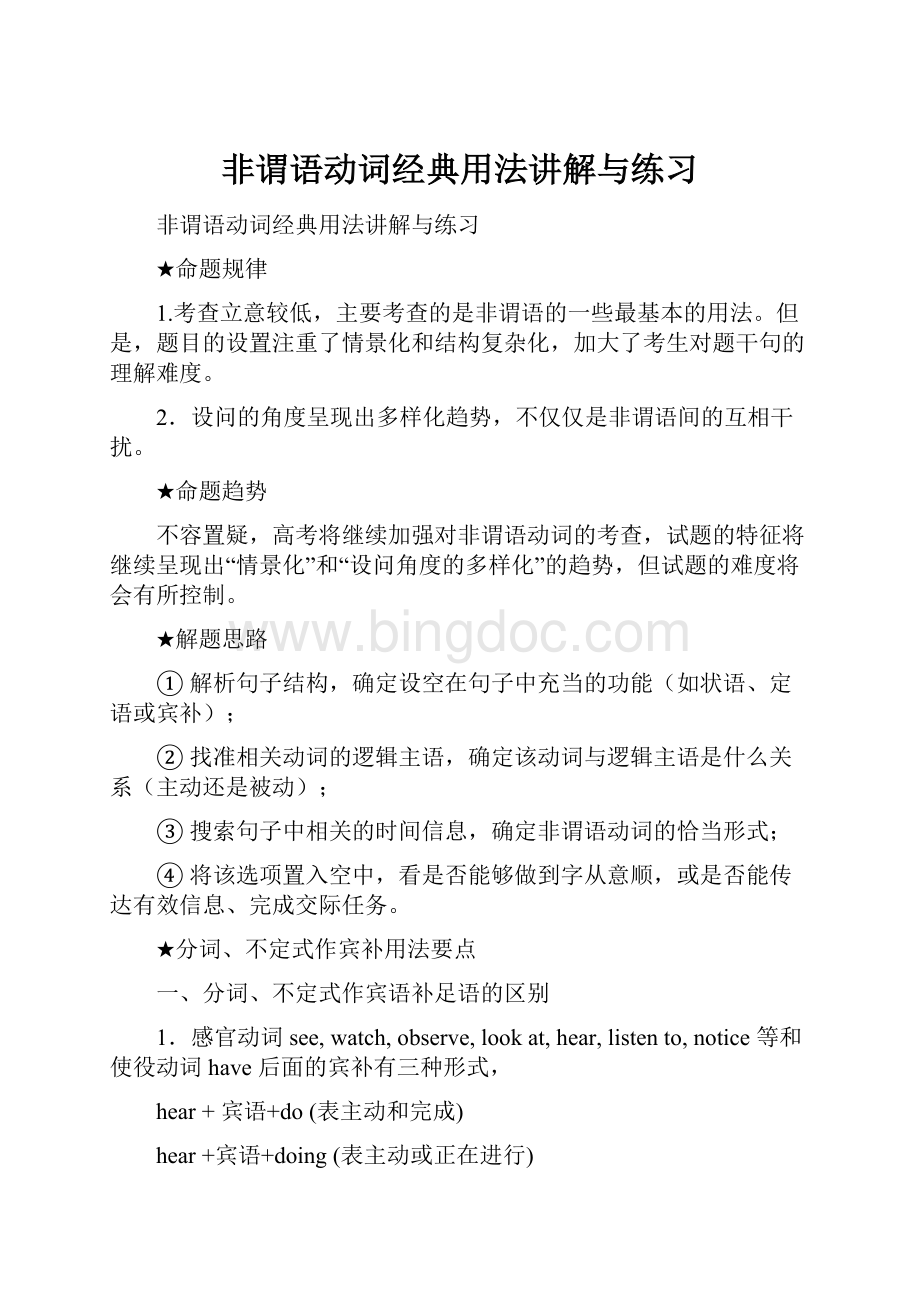非谓语动词经典用法讲解与练习.docx
《非谓语动词经典用法讲解与练习.docx》由会员分享,可在线阅读,更多相关《非谓语动词经典用法讲解与练习.docx(32页珍藏版)》请在冰点文库上搜索。

非谓语动词经典用法讲解与练习
非谓语动词经典用法讲解与练习
★命题规律
1.考查立意较低,主要考查的是非谓语的一些最基本的用法。
但是,题目的设置注重了情景化和结构复杂化,加大了考生对题干句的理解难度。
2.设问的角度呈现出多样化趋势,不仅仅是非谓语间的互相干扰。
★命题趋势
不容置疑,高考将继续加强对非谓语动词的考查,试题的特征将继续呈现出“情景化”和“设问角度的多样化”的趋势,但试题的难度将会有所控制。
★解题思路
①解析句子结构,确定设空在句子中充当的功能(如状语、定语或宾补);
②找准相关动词的逻辑主语,确定该动词与逻辑主语是什么关系(主动还是被动);
③搜索句子中相关的时间信息,确定非谓语动词的恰当形式;
④将该选项置入空中,看是否能够做到字从意顺,或是否能传达有效信息、完成交际任务。
★分词、不定式作宾补用法要点
一、分词、不定式作宾语补足语的区别
1.感官动词see,watch,observe,lookat,hear,listento,notice等和使役动词have后面的宾补有三种形式,
hear+宾语+do(表主动和完成)
hear+宾语+doing(表主动或正在进行)
hear+宾语+done(表被动或完成)如
IheardKevinanEnglishsongjustnow.(sing)
IheardKevinanEnglishsongwhenIpassedbyherroomyesterday.
IheardtheEnglishsongmanytimes.
注意:
不及物动词的过去分词作宾补表完成和状态。
如:
Ilookeddownatmyneckandfoundmynecklacegone.(状态)
Iwassurprisedtofindmyhometownchangedsomuch.(完成)
EXERCISE:
1、Isawhim___________(change)thewheelofhiscaryesterday.我看见他在换汽车轮子。
(意味着我看到了整个动作过程)
2、Isawhim___________(change)thewheelofhiscarwhenIarrivedathishouse.我看见他换汽车轮子。
(可能意味着我只看到动作过程的一部分)
3、Isawthewheelofhiscar_________(change)byaboyjustnow.
4、Isawhim__________(run)downthestreet.我看见他沿着街跑。
5、Ifeltanant_________(climb)overmyleg.我感到一只蚂蚁正在我的腿上爬。
6、SuddenlyInoticedher__________(stand)outside.突然我注意到她正站在外边。
7、Whenwewenthome,wefoundthedoor______(lock).
8、Wecanhearthewindows___________(beat)bytheheavyraindrops.
9、Theyfeltthemselves_________(cheat).
10、TheAmericanChineseisamazedtofindhishometowngreatly_________(change).
11、Icouldhearthegirls_________(sing)intheclassroomwhenIenteredtheclasssroon..我能听到女孩们在教室里唱歌。
12、Ihaveneverheardthesong__________(sing)inmyschool.
13、InthedreamPetersawhimself__________byafiercewolf,andhewokesuddenlywithastart.(2006上海卷)
A.chasedB.tobechasedC.bechasedD.havingbeenchased
14Afteraknockatthedoor,thechildheardhismother’svoice him.(2007上海春)
A.callingB.calledC.beingcalledD.tocall
15、Hewasseen_________(cross)theroadyesterday.(整个过程)有人看见他穿过马路。
16、Hewasseen__________(cross)theroad(正在进行的动作)有人看见他在穿过马路。
17、Themissingboyswerelastseen_________(play)neartheriver.
2.leave后接三种形式作宾补时,其中的leave保留了原来之义“留下”,但表达的确切之义应是“使……处于某种状态)。
leavesb.doingsth.让某人一直做某事(宾语和宾补之间是主谓关系,表示动作正在进行。
)
leavesth.undone留下某事未做(宾语和宾补之间是动宾关系,表示被动和完成,一般以undone,unfinished,unsettled,untouched为多)
leavesb.todosth.留下某人做某事
leavesth.tobedone留下某事要做(不定式表示将来的动作。
)
如:
It’swrongofyoutoleavethemachine______(run).
Theguestsleftmostofthedishes_____(untouch),becausetheydidn’ttastedelicious.
Heleft,leavingme_____(do)alltherestwork.
Wehurriedlyendedourmeeting,leavingmanyproblemstobesettled.
3.have,get后接三种形式作宾补时,其中have,get表示“使、让、叫”之意。
①havesth.done=getsth.done“使/让某事由别人去做”(叫/让某人做某事)。
如
I’llhave/getmybikerepairedtomorrow.
此外,havesth.done还表示“使遭受……”之意。
如
Tomhadhislegbrokenwhileplayingfootball.
Mr.Smithhadhishousebrokenintowhilehewasawayonholiday.
②havesb./sth.doing使/让某人/物持续地做某事(现在分词表示主动,正在进行)
getsb./sth.doing使某人/物开始行动起来
如:
Thepeasantshadthetractorworkingdayandnightattheharvesttime.
Thecaptaingotthesoldiersmovingtowardthefrontafterashortrest.
休息了片刻之后,上尉让士兵们开始朝前线行进起来。
注意:
“havesb.doing”若用于否定句中,其中have有“容忍”之意。
如:
Iwon’thaveyouspeakingtoyourparentslikethat.
Don’thavethewaterrunningallthetime.不要让水流个不停。
③havesb.dosth.(getsb.todosth.)使/让/叫某人去做某事
如:
Motherhadmegototheshopandbuysomesalt.
Ican’tgethimtostopsmoking.Hewon’tlistentome.
EXERCISES:
1,Hemanagedtogetthetask________(finish)ontime.他设法按时完成了任务。
2,Thedirectorgotherassistant__________somehotdogsforthemeeting.(2008全国II卷)
A.pickedupB.picksupC.topickupD.pickingup,
3,JennyhopesthatMr.SmithwillsuggestagoodwaytohaveherwrittenEnglish________inashortperiod.(2007福建卷)
A.improvedB.improvingC.toimprove.improve,
4--Goodmorning.CanIhelpyou?
--I'dliketohavethepackage__________(weigh),madam.
5,Thedirectorhadherassistant__________somehotdogsforthemeeting.(2008全国II卷)
A.pickedupB.picksupC.pickupD.pickingup
6Myparentshavealwaysmademe________aboutmyself,evenwhenIwastwelve.(2007江苏卷)
A.feelingwellB.feelinggoodC.feelwellD.feelgood
7Theyusecomputerstokeepthetraffic_________smoothly.(2009全国II卷)
A.beingrunB.runC.torunD.running
8SorryIkeptyou_____(wait)alongtime.
9Theyshutthedoorandleftleavingthefire________(burn).
have+宾语+宾语补足语。
〔精练〕用括号内所给动词的适当形式填空。
1.Acomputerdoesonlywhatthinkingpeoplehaveit____(do).
2.Whodidyouhave____(paint)thewallyesterday?
3.Thevillagersaregoingtohaveanewbridge_____(build)overtheriver.
4.Wehadthemachine_____(mend)justnow.
5.Thepatientisgoingtohavehistemperature_____(take).
6.Shehadhermoney_____(steal)whenshegotonthebus.
7..Iwon'thaveyou_____(say)so.
8.Don’thavethedog_____(bark)much,Lilin.李林,别让狗狂吠不停。
9.I’mleaving.Doyouhaveanything_____(say)?
10.Sheisgoingtoattendanimportantmeeting,butshehasnoclothes_____(wear).
11.Thepoorwomanhadasmallroom_____(livein).
12.Wehavealotofmoney.Doyouhaveanything_____(worryabout)?
13."Doyouhaveanyclothes_____(wash)?
Sir"askedthemaid(女仆).
14、Ican’tgoswimmingtoday,forIhavesomanyclothes_____(wash).
15.Theymightjusthaveaplace_____onthewritingcourse-whydon’tyougiveitatry?
A.leaveB.leftC.leavingD.toleave
二、下列动词后跟带to的不定式作补语:
advise,allow,ask,beg,cause,encourage,expect,forbid,force,get,intend,invite,like,love,order,persuade,prefer,require,teach,tell,want,warn,wish,等。
如:
①Anarmyspokesmanstressedthatallthesoldiershadbeenorderedtoissueclearwarningbeforefiringanyshots.
②Theteacheraskedusnottomakesomuchnoise.
③Thefluisbelievedtobecausedbyvirusesthatliketoreproduceinthecellsinsidethehumannoseandthroat.
三、不定式、现在分词作宾补小窍门
下列动词后在主动语态中用不带to的不定式作补语,但在被动语态中要加上to:
它们是“吾看三室两厅一感觉”——5看(lookat,see,watch,notice,observe);3使(make,let,have);2听(listento,hear);1感觉(fell)。
以上动词还可用现在分词作宾语补足语(5+3+2+1-2+4):
即以上动词除let,make外都可以用现在分词作宾语补足语,此外find,catch,keep,have也可以用现在分词作宾语补足语。
如:
Atthattime,Ifoundhimcryinginthestreet.
Hewascaughtstealing.I’msorrytohavekeptyouwaitingforsuchalongtime.
Themissingboyswerelastseenplayingneartheriver.
四with结构过去分词用在“with+宾语+宾补”这一结构
翻译下列句子
1.Thefarmerswalkedtothefieldwithhoesontheirshoulders.
2.Myfatherwassittinginachairwithhishandsfolded.
3.Thedaywasbright,withafreshbreezeblowing.
4.Tomisworkingtherewithonlyashirton.
5.Wesleptlastnightwiththelightson.
6.Johnlefttheroomwiththewindowsopen.
7.Mybrotherrushedintotheclassroom,withsweatdripping.
8.Theartistisworkingwithhishairtiedback.
9.Thestrangerisstandingtherewithhiseyeslookingatme.
10.Shestoodtherewithhiseyesfixedonme.
用所给词的正确形式填空
11.InpartsofAsiayoumustnotsitwithyourfeet_____________(point)atanotherperson.
12.Helaytherewithhiseyes___________(look)atthesky.
13.Thestudentsarelisteningtotheteacherwiththeireyes___________(fix)ontheblackboard.
14.Thethiefwasbroughtinwithhishands___________(tied)back.
15.Withallthesemouths__________(feed),hedidn’tknowwhattodo.
16.Withtime___________(go)by,weunderstandmoreandmore.
17.Theteachercamein_________________________________.(手里拿着一些教科书)
18.Itisabeautifulvillagewithamountain____it.
A.surroundedB.surroundingC.havingsurroundedD.havingbeensurrounded
19.Withsomuchwork________(do),hefeltupset.
20.Withalotofproblems_________(dealwith),thenewpresidenthasahardtime.
21.Withalltheproblems_________(settle),thepresidentfeltatease.
22.Withsomanyfriends________(careabout)me,Ifeelveryhappy.
23.Thethiefwasbroughtin,withhishands________behindhisback.
A.beingtiedB.havingtiedC.tobetiredD.tied
—Comeon,pleasegivemesomeideasabouttheproject.
—Sorry.Withsomuchwork________ mymind,Ialmostbreakdown.(2007福建卷)
A.filledB.fillingC.tofillD.beingfilled
★不定式、分词作定语用法要点
一、不定式作定语
1.作定语的不定式如果是不及物动词,或者不定式所修饰的名词或代词是不定式动作的地点、工具等,不定式后面须有相应的介词。
如:
TheBrownshaveacomfortablehousetolivein.
Thereisnothingtoworryabout.
Pleasegivemeaknifetocutwith.
Hereissomepaperforyoutowriteon.
但是,不定式所修饰的名词如果是time,place或way时,不定式后面的介词习惯上省去。
如:
Hehadnomoneyandnoplacetolive(in).
Wefoundawaytosolvethisproblem(in).
2.当作定语的不定式所修饰的名词或代词是不定式动作的承受者时,不定式既可以用主动语态,也可用被动语态,但其含义有所不同。
试比较:
Haveyouanythingtosend?
你有什么东西要寄吗?
(不定式tosend的动作执行者是“你”)
Haveyouanythingtobesent?
你有什么要(我或别人)寄的东西吗?
(不定式tobesent的动作执行者是“我”或“别人”)
3.用不定式作定语的几种情况:
不定式表将来:
Iborrowedsomebookstoreadduringmyholiday.
用来修饰被序数词、最高级或no,all,any等限定的中心词。
如:
Hewasthebestmantodothejob.
ShewasthefirstwomantowinthegoldmedalintheOlympicGames.
Womenandchildrenwerethefirsttogetintothelifeboats.
用来修饰的词是抽象名词时,常见的有:
ability,chance,idea,fact,excuse,promise,answer,reply,attempt,belief,way,reason,moment,time等。
如:
DoyouhavetheabilitytoreadandwriteEnglish?
Ihave achancetogosight–seeing.
二、分词作定语
1.作定语的及物动词分词形式为:
V–ing;being+过去分词;当被修饰的名词与分词为主动关系时,用V–ing;当被修饰的名词与分词为被动关系且表正在进行时,用being+过去分词;当被修饰的名词与分词为被动关系且表完成时,用过去分词。
例如:
Thehousesbeingbuiltarefortheteachers.
ThebrokenglassisTom’s.
Ihaveneverseenamoremovingmovie.
2.作定语的不及物动词分词形式为:
V–ing和过去分词。
V–ing表示正在进行;过去分词表示已经完成。
如:
fallingleaves正落的叶子 fallenleaves落下的叶子
boilingwater正沸腾的水 boiledwater沸腾过的水(白开水)